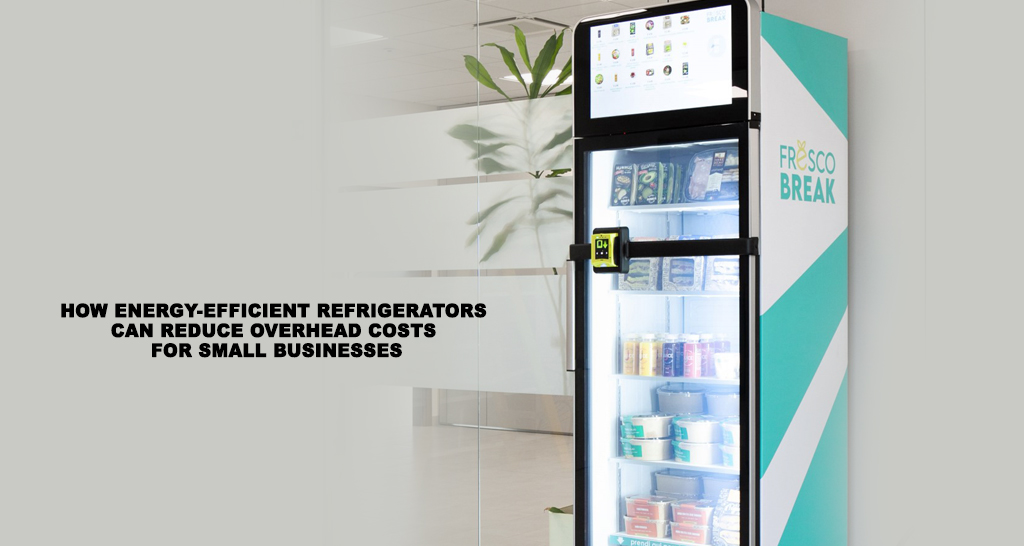Running a small business involves juggling numerous expenses, with energy costs often being a significant portion of overhead. Investing in energy-efficient refrigerators can be a game-changer for small businesses looking to cut down on these expenses.
Modern energy-efficient refrigerators use advanced technology to minimize power consumption, leading to substantial savings on energy bills. Beyond the financial benefits, these appliances also contribute to a greener environment by reducing the overall carbon footprint. Below, we cover how energy-efficient refrigerators can play a pivotal role in reducing overhead costs for small businesses.
1. Lower Energy Consumption
Energy-efficient refrigerators are designed to use less electricity compared to traditional models. They incorporate features such as better insulation, advanced compressors, and precise temperature control systems.
These enhancements ensure that the refrigerator maintains optimal performance while consuming minimal energy. For small businesses, this translates to lower monthly utility bills. Over time, the savings can be substantial, allowing business owners to allocate funds to other critical areas such as marketing, inventory, or employee benefits.
2. Reduced Maintenance and Repair Costs
Energy-efficient refrigerators are often built with high-quality components that ensure durability and longevity. These appliances typically require less maintenance and are less prone to breakdowns, reducing the need for costly repairs.
By investing in reliable, energy-efficient models, small businesses can avoid the inconvenience and expense of frequent repairs, contributing to lower overall operational costs. Additionally, many energy-efficient refrigerators come with extended warranties, providing further financial protection and peace of mind for business owners.
3. Government Incentives and Rebates
Many governments and utility companies offer incentives and rebates to encourage businesses to invest in energy-efficient appliances. These financial incentives can significantly offset the initial purchase cost of energy-efficient refrigerators.
Small businesses should research available programs in their area and take advantage of these opportunities. By doing so, they can enjoy the benefits of lower energy bills while also receiving financial support from government programs designed to promote sustainability and energy conservation.
4. Improved Corporate Image
In today’s market, consumers are increasingly environmentally conscious and prefer to support businesses that demonstrate sustainable practices. By investing in energy-efficient refrigerators, small businesses can enhance their corporate image and attract eco-conscious customers.
Promoting the use of energy-efficient appliances can be a powerful marketing tool, helping to differentiate a business from its competitors. This improved reputation can lead to increased customer loyalty and higher sales, further reducing overall overhead costs.
5. Availability of Affordable Options
The market for energy-efficient appliances has grown significantly, leading to increased competition and a wider range of options. Small businesses can find affordable energy-efficient refrigerators that fit their budget and meet their needs.
For example, visiting trusted online vendors that often have refrigerator on sale can be an excellent way to find high-quality, energy-efficient models at reduced prices. These sales provide an opportunity for small businesses to invest in energy-efficient appliances without breaking the bank, making it a more accessible investment.
6. Long-Term Investment Benefits
While the initial cost of energy-efficient refrigerators may be higher than traditional models, the long-term savings make them a worthwhile investment. Over the lifespan of the refrigerator, the reduced energy consumption translates to significant cost savings.
Additionally, the enhanced durability and reduced need for repairs contribute to lower overall maintenance expenses. This long-term financial benefit is particularly important for small businesses looking to manage their budgets effectively. By choosing energy-efficient appliances, businesses can ensure a better return on investment and more predictable long-term cost savings.
7. Streamlined Operations and Inventory Management
Investing in energy-efficient refrigerators can lead to improved efficiency in operations. These appliances often come with smart technology features that enable better inventory management and monitoring. For instance, some models allow business owners to track energy consumption, temperature fluctuations, and even inventory levels remotely.
This capability can help small businesses streamline their operations, reduce waste, and make informed decisions about restocking. As a result, better operational efficiency translates into reduced overhead costs and increased profitability.
8. Enhanced Product Longevity
Energy-efficient refrigerators are designed with advanced technology that not only optimizes energy use but also ensures the longevity of the stored products. By maintaining consistent temperatures and humidity levels, these refrigerators help extend the shelf life of perishable goods.
This is particularly beneficial for businesses such as restaurants, cafes, and grocery stores, where spoiled inventory can lead to significant financial losses. By reducing waste and ensuring that products remain fresh for longer, small businesses can improve profitability and lower their overall operational
Conclusion
Incorporating energy-efficient refrigerators into your business operations is a strategic move that offers both economic and environmental benefits. By lowering energy consumption, these appliances help small businesses save on utility bills, allowing for the reallocation of resources to other critical areas. Moreover, the reduced carbon footprint aligns with sustainable business practices, enhancing your company’s reputation among eco-conscious consumers. Embrace energy efficiency and watch as your overhead costs decrease, contributing to a more sustainable and profitable business.








